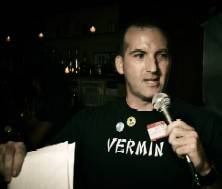 Last week, I attended “Liner Notes for MP3’s: A Panel Discussion of Contemporary Music Writing,” an event functioning as a part of the Early Spring Literary Festival. The members of the panel were Dave Housley, (writer and editor of Barrelhouse), Jim Ruland, (writer and organizer of Vermin on the Mount Reading Series) and SP’s own Doug Hoepker and Seth Fein. The event commenced with each member of the panel giving a brief background of their experiences in the field of music writing, and then moved into discussions concerning a plethora of engaging, music-related topics.
Last week, I attended “Liner Notes for MP3’s: A Panel Discussion of Contemporary Music Writing,” an event functioning as a part of the Early Spring Literary Festival. The members of the panel were Dave Housley, (writer and editor of Barrelhouse), Jim Ruland, (writer and organizer of Vermin on the Mount Reading Series) and SP’s own Doug Hoepker and Seth Fein. The event commenced with each member of the panel giving a brief background of their experiences in the field of music writing, and then moved into discussions concerning a plethora of engaging, music-related topics.
Jim Ruland
One highlight of the event was when Ruland and Hoepker shared personal stories involving Ian MacKaye, (frontman of Minor Threat and Fugazi). One story involved MacKaye being beaten with a shoe onstage, and another involved him telling an audience to sit down during a Fugazi show. Another highlight was the discussion concerning the power Pitchfork holds in the music world and how its influence is of a different nature than say, Rolling Stone in the 1970’s.
Audience members posed many of the questions answered by the panel. For example, Ruland was asked what he believes is the difference between literary criticism and music criticism, to which he responded that both are “massively subjective” experiences, but he believes that one’s experience of music is more personal in nature.
On the whole, the event was interesting and enjoyable. The panel members all seemed to know their music freakishly well, and every once in a while, one of them would take a playful jab at another’s views and opinions, keeping the discussion from becoming too high-minded.
* * *
 If you missed the event, I had the opportunity to conduct a brief interview with panel members Dave Housely (pictured left), and Jim Ruland prior to the discussion. This is what they had to say.
If you missed the event, I had the opportunity to conduct a brief interview with panel members Dave Housely (pictured left), and Jim Ruland prior to the discussion. This is what they had to say.
SP: What initially drew you to music writing?
DAVE: I’m a fiction writer who uses a lot of rock and roll in my stories (I have a collection of rock-themed stories, called “If I Knew the Way, I Would Take You Home,” coming out on Dark Sky Books next year), so I’m not really a music writer, but there’s a lot of music in what I write. For me, music is an entry point into something else. It’s such an important part of life for so many people that it feels like a natural entry point into how people live their lives, what their disappointments are, what they’re striving for, all of that “stuff of real life.” If you’re playing in a KISS cover band, that might say a lot about how you thought life was going to go, how it actually went, and the kind of compromises you might have had to make with yourself and the world in order to make peace with all of that. In that way, I think music can be a kind of shorthand, a quick way into a story and a character, for me and a reader.
JIM: I’m a punk rocker and I got into zine writing primarily as a way to get access to the music I love. I went from writing record reviews, to show reports, to band interviews and eventually figured out how to combine the three into profiles and features. Like anything, the more I did it, the better I got at it and that carried over to other kinds of writing.
SP: How has your experience in this field deepened your understanding of music as an art form and as a business?
DAVE: For me, it’s really thinking about what music means to people. Fans, artists, hangers on, family, everybody. I’m one of the editors of Barrelhouse magazine, and we publish a lot of essays that are pop culture and music based. We’re always interested in music and pop culture, again, as an entry point into a personal experience. In our latest issue, we have essays on Night Ranger and on Nick Cave and the Bad Seeds. The essays aren’t about those bands, as much as they’re about what the author was going through when they went to see Night Ranger, or went on tour with Nick Cave. So what we’re always looking for is a way to take that universal experience– even a Night Ranger concert can be a universal experience, right? — and make it uniquely personal.
JIM: The thing about music writing is that you’re writing for an active audience. People read newspapers and novels with an expectation that they’ll be informed or entertained, but with music writing, the audience brings their particular bias to their reading of your review, which is seldom a surprise and still manages to shock. So that aspect of music writing enlarged my understanding of how to write for an audience. Music in our culture is almost always packaged as a product so it’s a business first and an art sometimes. The line between press and promotion in the music field is hazier than most, especially now that a review often accompanies a link to purchase a digital music file.
SP: How is field of music writing adapting to music becoming increasingly digital, easier to pirate, and more diverse in sound?
JIM: It makes it easier. It used to be a label rep would send their new releases to the music editor at a magazine, newspaper or zine, and they would or wouldn’t assign the record for review. Now you, that rep or PR person, or even the band themselves can zap a link to a blogger and get a more reliable result in a fraction of the time.
SP: In your opinion, does music writing have the ability to alter the musical world? If so, how?
JIM: Sure, a review in a zine can connect a kid in the middle of nowhere to a scene on the other side of the world. It happens every day. Songs of protest. Songs of longing. We live in a free society that we take for granted, but when 16 and living in a small town the world feels like a gulag. The music makes the magic happen. But good writing is the gateway drug.








